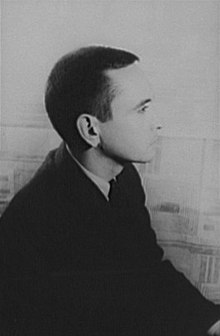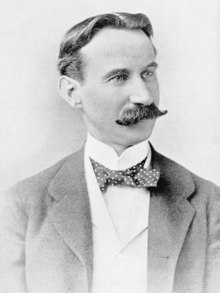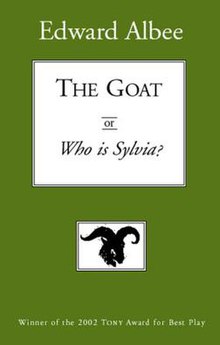Edward Franklin Albee III (/ˈÉ"ËlbiË/ AWL-bee; born March 12, 1928) is an American playwright known for works such as The Zoo Story (1958), The Sandbox (1959), and Who's Afraid of Virginia Woolf? (1962). His works are often considered as well-crafted, realistic examinations of the modern condition. His early works reflect a mastery and Americanization of the Theatre of the Absurd that found its peak in works by European playwrights such as Samuel Beckett, Eugène Ionesco, and Jean Genet. Younger American playwrights, such as Paula Vogel, credit Albee's daring mix of theatricality and biting dialogue with helping to reinvent the post-war American theatre in the early 1960s. Albee continues to experiment in works such as The Goat, or Who Is Sylvia? (2002).
Life and career

According to Magill's Survey of American Literature (2007), Edward Albee was born somewhere in Virginia (one popular belief is that he was born in Washington, D.C.). He was adopted two weeks later and taken to Larchmont, New York in Westchester County, where he grew up. Albee's adoptive father, Reed A. Albee, the wealthy son of vaudeville magnate Edward Franklin Albee II, owned several theaters. Here the young Edward first gained familiarity with the theatre. His adoptive mother, Reed's third wife, Frances (Cotter), tried to raise Albee to fit into their social circles. Albee attended the Clinton High School, then the Lawrenceville School in New Jersey, from which he was expelled. He then was sent to Valley Forge Military Academy in Wayne, Pennsylvania, where he was dismissed in less than a year. He enrolled at The Choate School (now Choate Rosemary Hall) in Wallingford, Connecticut, graduating in 1946. His formal education continued at Trinity College in Hartford, Connecticut, where he was expelled in 1947 for skipping classes and refusing to attend compulsory chapel.
Albee left home for good when he was in his late teens. In a later interview, he said: "I never felt comfortable with the adoptive parents. I don't think they knew how to be parents. I probably didn't know how to be a son, either." More recently, he told interviewer Charlie Rose that he was "thrown out" because his parents wanted him to become a "corporate thug" and did not approve of his aspirations to become a writer.
Albee moved into New York's Greenwich Village, where he supported himself with odd jobs while learning to write plays. His first play, The Zoo Story, was first staged in Berlin. The less than diligent student later dedicated much of his time to promoting American university theatre. He currently is a distinguished professor at the University of Houston, where he teaches an exclusive playwriting course. His plays are published by Dramatists Play Service and Samuel French, Inc..
Albee is openly gay and states that he first knew he was gay at age 12 and a half. He has insisted, however, that he does not want to be known as a "gay writer", stating in his acceptance speech for the 2011 Lambda Literary Foundation's Pioneer Award for Lifetime Achievement: "A writer who happens to be gay or lesbian must be able to transcend self. I am not a gay writer. I am a writer who happens to be gay."
Albee's longtime partner, Jonathan Thomas, a sculptor, died on May 2, 2005, from bladder cancer.
Honors
A member of the Dramatists Guild Council, Albee has received three Pulitzer Prizes for dramaâ€"for A Delicate Balance (1967), Seascape (1975), and Three Tall Women (1994). His play Who's Afraid of Virginia Woolf was selected for the 1963 Pulitzer Prize by the award's drama jury, but was overruled by the advisory committee, which elected not to give a drama award at all. Albee was elected a Fellow of the American Academy of Arts and Sciences in 1972. In 1985, Albee was inducted into the American Theatre Hall of Fame. In 1999, Albee received the PEN/Laura Pels International Foundation for Theater Award as a Master American Dramatist. He received a Special Tony Award for Lifetime Achievement (2005); the Gold Medal in Drama from the American Academy and Institute of Arts and Letters (1980); as well as the Kennedy Center Honors and the National Medal of Arts (both in 1996). In 2009 Albee received honorary degree a.k.a. "Doctor Honoris Causa" by the Bulgarian National Academy of Theater and Film Arts (NATFA), a member of the Global Alliance of Theater Schools.
Albee is the President of the Edward F. Albee Foundation, Inc., which maintains the William Flanagan Memorial Creative Persons Center, a writers and artists colony in Montauk, New York.
In 2008, in celebration of Albee's eightieth birthday, a number of his plays were mounted in distinguished Off Broadway venues, including the historic Cherry Lane Theatre. The playwright directed two of his one-acts, The American Dream and The Sandbox, there. These were first produced at the theater in 1961 and 1962, respectively.
Plays
Essays

- Stretching My Mind: Essays 1960â€"2005 (Avalon Publishing, 2005)
Discography

- Mark Richman & William Daniels in The Zoo Story by Edward Albeeâ€"Directed by Arthur Luce Klein (LP, Spoken Arts SA 808)
The Edward F. Albee Foundation

The Edward F. Albee Foundation was founded in 1967 by Edward Albee, after proceeds from his play Who's Afraid of Virginia Woolf? proved abundant. The foundation had maintained the William Flanagan Memorial Creative Persons Center (better known as "The Barn") in Montauk, on Long Island in New York, as a residence for writers and visual artists. The mission of the foundation is to serve writers and visual artists from all walks of life, by providing time and space in which to work without disturbance. The only criteria for selection is talent and need and the foundation invites any and all artists to apply.
- Edward Albee: Founder and President
- Rex Lau: Co-Caretaker of the Barn
- Diane Mayo: Co-Caretaker of The Barn
- Jakob Holder: Executive Director
Quotes
- "What could be worse than getting to the end of your life and realizing you hadn't lived it?"
- "A usefully lived life is probably going to be, ultimately, more satisfying."
- "Writing should be useful. If it can't instruct people a little bit more about the responsibilities of consciousness there's no point in doing it."
- "If you're willing to fail interestingly, you tend to succeed interestingly."
- "That's what happens in plays, yes? The shit hits the fan."
- "Creativity is magic. Don't examine it too closely."
- "Sometimes it's necessary to go a long distance out of the way in order to come back a short distance correctly."
- "All serious art is being destroyed by commerce. Most people don't want art to be disturbing. They want it to be escapist. I don't think art should be escapist. That's a waste of time."
Awards and nominations
- Awards
- 1960: Drama Desk Award Vernon Rice Award: The Zoo Story
- 1963: Tony Award for Best Play: Who's Afraid of Virginia Woolf?
- 1967: Pulitzer Prize for Drama: A Delicate Balance
- 1975: Pulitzer Prize for Drama: Seascape
- 1994: Pulitzer Prize for Drama: Three Tall Women
- 1996: National Medal of Arts
- 2002: Drama Desk Award Outstanding New Play: The Goat, or Who Is Sylvia?
- 2002: Tony Award for Best Play: The Goat, or Who Is Sylvia?
- 2005: Special Tony Award for Lifetime Achievement
- 2005: Academy of Achievement's Golden Plate Award
- 2008: Drama Desk Award Special Award
- 2011: Edward MacDowell Medal for Lifetime Achievement
- 2011: Pioneer Award for Lifetime Achievement, Lambda Literary Foundation
- 2015: America Award in Literature
- Nominations
- 1964: Tony Award for Best Play: The Ballad of the Sad Cafe
- 1965: Tony Award for Best Author of a Play: Tiny Alice
- 1965: Tony Award for Best Play: Tiny Alice
- 1967: Tony Award for Best Play: A Delicate Balance
- 1975: Drama Desk Award Outstanding New Play: Seascape
- 1975: Tony Award for Best Play: Seascape
- 1976: Drama Desk Award Outstanding Director of a Play: Who's Afraid of Virginia Woolf?
- 1994: Drama Desk Award Outstanding Play: Three Tall Women
- 2001: Pulitzer Prize for Drama: The Play About the Baby
- 2003: Pulitzer Prize for Drama: The Goat, or Who Is Sylvia?
- 2005: Tony Award for Best Revival of a Play: Who's Afraid of Virginia Woolf?
The Pulitzer Prize committee for the Best Play in 1963 recommended Who's Afraid of Virginia Woolf?, but the Pulitzer board, which has sole discretion in awarding the prize, rejected the recommendation, due to the play's perceived vulgarity, and no award was given that year.
See also
References
Further reading

- Solomon, Rakesh H. Albee in Performance. Bloomington: Indiana University Press, 2010.
External links
- Edward F. Albee Foundation
- The Edward Albee Society
- Edward Albee at the Internet Broadway Database
- Edward Albee at the Internet Off-Broadway Database
- Edward Albee at the Internet Movie Database
- Appearances on C-SPAN
- Works by or about Edward Albee in libraries (WorldCat catalog)
- Edward Albee collected news and commentary at The Guardian
- Edward Albee collected news and commentary at The New York Times
- Guardian (UK) Profile of Edward Albee, The Guardian, 2004
- William Flanagan (Fall 1966). "Edward Albee, The Art of Theater No. 4". The Paris Review.Â
- "Interviews with Edward Albee", TonyAwards
- Notes on a Colloquy with Edward Albee, Artslynx
- Performance by Edward Albee, Long House Theatre
- Cherry Lane Theatre website
- "The Friars Club"
- Who's afraid of Edward Albee, Laura Parker, Intelligent Life, 2009
- Albee with Joe Cino at benefit for the Caffe Cino
- Edward Albee "The Theater Today: Several Forms of Absurdity" The Baltimore Museum of Art: Baltimore, Maryland, 1963 Accessed June 26, 2012
- Edward Albee scripts, 1949-1966, held by the Billy Rose Theatre Division, New York Public Library for the Performing Arts
